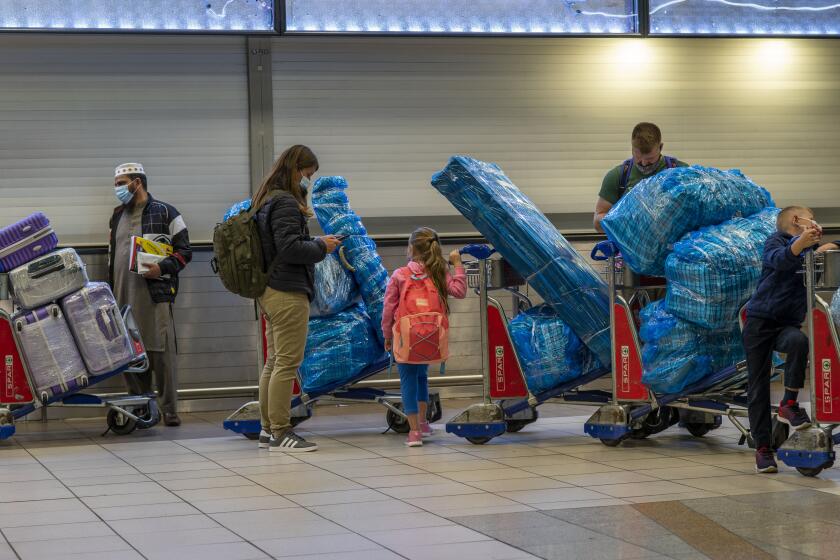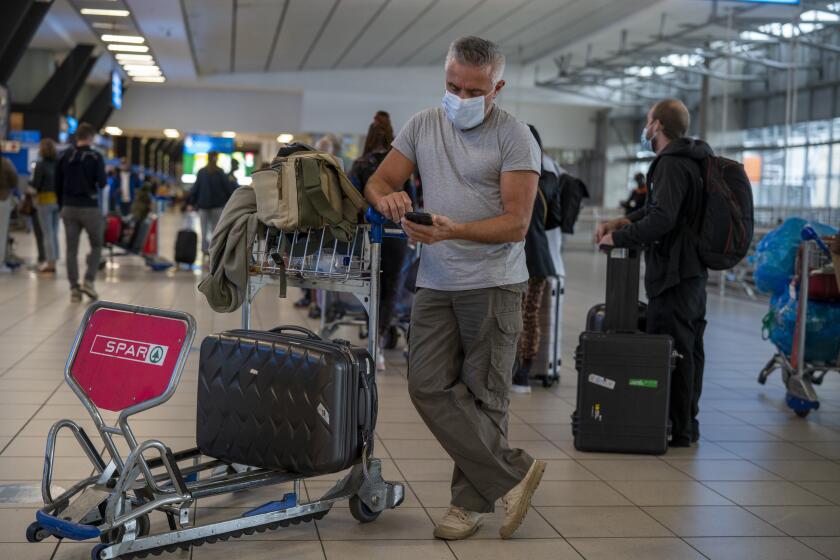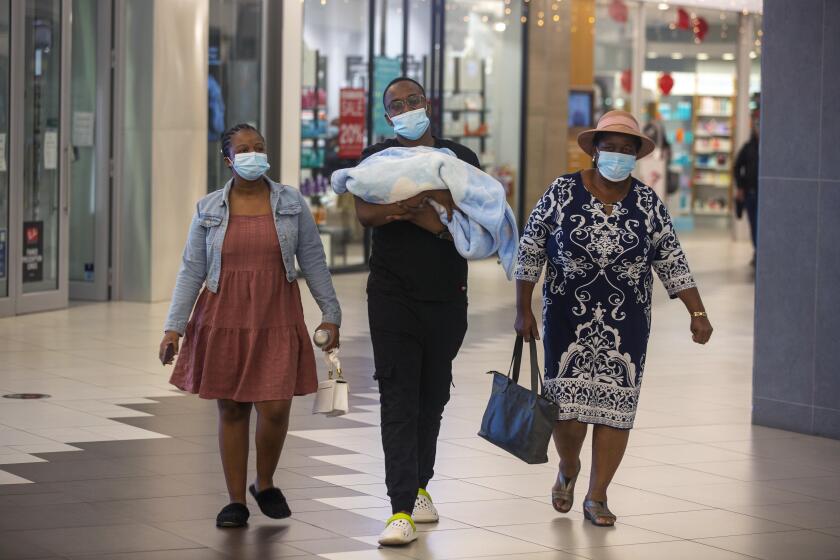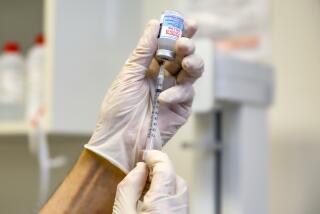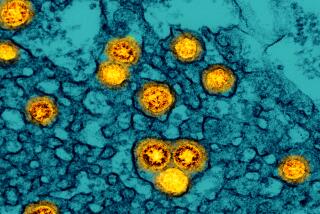Omicron variant prompts U.K. to tighten rules as Germany and Italy report new cases
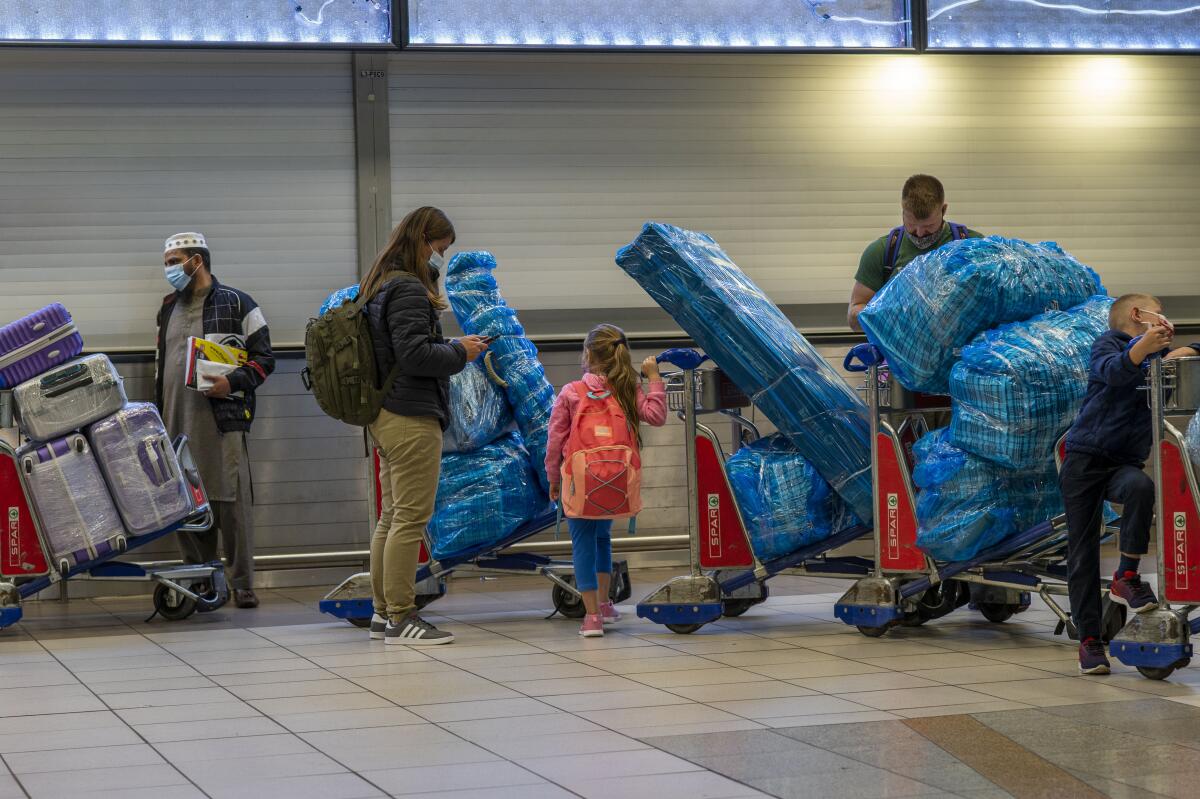
- Share via
LONDON — The new potentially more contagious Omicron variant of the coronavirus popped up in more European countries on Saturday, just days after being identified in South Africa, leaving governments around the world scrambling to stop the spread.
The U.K. tightened rules Saturday on mask wearing and on testing of international arrivals after finding two cases. New cases were confirmed Saturday in Germany and Italy, with Belgium, Israel and Hong Kong also reporting that the variant has been found in travelers.
In the United States, Dr. Anthony Fauci, the government’s top infectious diseases expert, said he would not be surprised if the Omicron variant was already in the U.S., too.
“We have not detected it yet, but when you have a virus that is showing this degree of transmissibility ... it almost invariably is ultimately going to go essentially all over,” Fauci said on NBC.
Because of fears that the new variant has the potential to be more resistant to the protection offered by vaccines, there are growing concerns around the world that the pandemic and associated lockdown restrictions will persist for far longer than hoped.
Nearly two years since the start of the pandemic that has claimed more than 5 million lives around the world, countries are on high alert. Many, including the U.S., have already announced travel restrictions on flights from southern Africa as they seek to buy time to assess whether the Omicron variant spreads more easily than the currently dominant Delta variant.
The discovery of the Omicron coronavirus variant prompts the U.S. to join the EU and other countries in restricting travel from southern Africa.
In Britain, Prime Minister Boris Johnson said it was necessary to take “targeted and precautionary measures” after two people tested positive for the new variant in England.
“Right now this is the responsible course of action to slow down the seeding and the spread of this new variant and to maximize our defenses,” he said at a news conference.
Among the measures announced, Johnson said anyone arriving in England must take a PCR test for COVID-19 on the second day after their arrival and self-isolate until they provide a negative test. If someone tests positive for the Omicron variant, their close contacts will have to self-isolate for 10 days regardless of their vaccination status, he said. For other variants, close contacts who are fully vaccinated are exempt from quarantine rules.
He also said that mask wearing will be required in shops and on public transportation and that the independent group of scientists that advises the British government on the rollout of COVID-19 vaccines had been asked to accelerate the country’s vaccination program. This could involve widening the booster program to younger age groups, reducing the time period between a second dose and a booster and allowing older children to get a second dose.
“From today we’re going to boost the booster campaign,” he said.
Sixty-one people who arrived in the Netherlands on two flights from South Africa tested positive for the coronavirus and were in isolation.
Britain’s Department of Health said the two cases found in the U.K. were linked to travel from southern Africa. One was in the southeastern English town of Brentwood, while the other was in the central city of Nottingham. The two infected people are self-isolating with their households while contact tracing and targeted testing takes place.
The British government also added four more countries — Angola, Malawi, Mozambique and Zambia — to the country’s travel red list starting Sunday. Six others — Botswana, Eswatini (also known as Swaziland), Lesotho, Namibia, South Africa and Zimbabwe — were added Friday. That means anyone permitted to arrive from those destinations will have to quarantine.
Many governments have slapped restrictions on travel from various southern African countries over the last couple of days, including Australia, Brazil, Canada, the European Union, Iran, Japan, Thailand and the U.S., in response to warnings over the potential transmissibility of the new variant, even though the World Health Organization has cautioned against overreaction before the variant was thoroughly studied.
Despite the banning of flights, there are mounting concerns that the variant has already been widely seeded around the world.
Italy and Germany were the latest to report confirmed cases of the Omicron variant.
An Italian who traveled to Mozambique on business landed in Rome on Nov. 11 and returned to his home near Naples. He and five family members, including two school-age children, have since tested positive, the Italian news agency LaPresse said. All are isolating in the Naples suburb of Caserta in good condition with light symptoms.
South African scientists have identified a new version of the coronavirus this week that they believe may be behind a recent spike in COVID-19 infections.
The variant was confirmed by Sacco hospital in Milan, and Italy’s National Health Institute said the man had received two doses of the vaccine. Italy’s Health Ministry is urging all regions to increase its tracing of the virus and sequencing to detect cases of the variant first identified in South Africa.
In Germany, the Max von Pettenkofer Institute, a Munich-based microbiology center, said that the Omicron variant was confirmed in two travelers who arrived on a flight from South Africa on Wednesday. The head of the institute, Oliver Keppler, said that genome sequencing has yet to be completed, but it is “proven without doubt that it is this variant,” German news agency DPA reported.
The Dutch public health institute said the Omicron variant was “probably found in a number of the tested persons” who were isolated after arriving Friday in Amsterdam on two flights from South Africa. The institute said in a statement that further sequencing analysis is underway to determine that it is the new variant. The results were expected Sunday. A total of 61 people were tested.
Israel said it detected the new variant in a traveler who had returned from Malawi, and it was tracing 800 travelers who returned recently from southern African countries.
The variant’s swift spread among young people in South Africa has alarmed health professionals even though there was no immediate indication whether the variant causes more severe disease.
A number of pharmaceutical firms, including AstraZeneca, Moderna, Novavax and Pfizer, said they have plans in place to adapt their vaccines in light of the emergence of Omicron. Pfizer and its partner BioNTech said they expect to be able to tweak their vaccine in about 100 days.
Andrew Pollard, director of the Oxford Vaccine Group, which developed the AstraZeneca vaccine, expressed cautious optimism that existing vaccines could be effective at preventing serious disease from the Omicron variant, noting that most of its mutations appear to be in similar regions as those in other variants.
“At least from a speculative point of view we have some optimism that the vaccine should still work against a new variant for serious disease, but really we need to wait several weeks to have that confirmed,” he told BBC radio.
Some experts said the variant’s emergence illustrated how rich countries’ hoarding of vaccines threatens to prolong the pandemic.
Fewer than 6% of people in Africa have been fully immunized against COVID-19, and millions of health workers and vulnerable populations have yet to receive a single dose. Those conditions can speed up the spread of the virus, offering more opportunities for it to evolve into a dangerous variant.
“One of the key factors to emergence of variants may well be low vaccination rates in parts of the world, and the WHO warning that none of us is safe until all of us are safe should be heeded,” said Peter Openshaw, a professor of experimental medicine at Imperial College London.
U.S. Secretary of State Antony J. Blinken spoke Saturday with his South African counterpart, Naledi Pandor, and they stressed the importance of working together to help African nations vaccinate their populations, the State Department said in a statement. It said Blinken praised South Africa’s scientists for quickly identifying the Omicron variant and the government for its transparency in sharing this information, “which should serve as a model for the world.”
More to Read
Sign up for Essential California
The most important California stories and recommendations in your inbox every morning.
You may occasionally receive promotional content from the Los Angeles Times.
